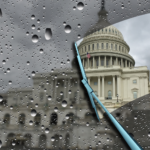Goldwater to Supreme Court: First Amendment Prohibits Manipulative Union Traps
What if you joined a club or a church or a political group, only to find out that you could never leave—or stop paying membership dues? That is, unless you did so in writing during a secret, amorphous annual opt-out period. And what if your employer freely gave the group special access to your paycheck to carry out this ploy?
That’s precisely the trap that Alaska’s attorney general uncovered when analyzing the state’s procedures regarding payroll deductions for public-sector union dues. Such practices violate the First Amendment rights of public employees, which is why the Goldwater Institute filed an amicus brief last week in the United States Supreme Court supporting Alaska’s efforts to stop them.
In 2018, the court made clear in its landmark Janus decision that an employee’s agreement to join a union and pay dues “cannot be presumed.” Instead, the government must prove that the employee freely agreed to join the union and pay its dues. Unions can’t force anyone to become—or remain—a paying member.
After Janus, Alaska’s attorney general reviewed state procedures to see if they complied with the court’s instructions. He concluded that, like many states, Alaska had given too much control to the unions through various state laws and union agreements limiting the state’s oversight.
For example, the unions provided their own dues deduction forms, which they also collected themselves and sent to the state, purportedly on behalf of their members. Not only did that give unions too much power to manipulate people, but the forms also did not adequately inform employees of their rights. The fine print also included a provision automatically renewing the person’s commitment to pay annual dues unless the person objected “not less than ten (10) days and not more than twenty (20) days before the end of any yearly period.”
But the unions wouldn’t tell employees when those dates were! In fact, they coincided with each employee’s hiring date, not the end of a typical “yearly period” like a calendar year, fiscal year, or school year. That meant the narrow opt-out window was different for every employee, and the unions wouldn’t tell employees when it was or how they could opt out. Even worse, the state could not show that union paperwork authorizing payroll deductions—and waiving First Amendment rights—was actually freely and voluntarily signed. That’s because the unions controlled the entire process and ran the scheme in a proverbial “black box” with no supervision.
Naturally, some public employees who learned of the unions’ manipulative tactics asked the state to immediately stop taking money out of their paychecks. But when the state did so, the Alaska State Employees Association (ASEA), the largest public-sector union in the state, threatened to sue to block any changes to its procedures.
Alaska Gov. Michael Dunleavy then issued an administrative order halting the shenanigans. He directed the state to use new payroll deduction forms clearly informing employees of their constitutional rights, required that the forms be submitted directly to the state by the employee (bypassing union middlemen), and allowed employees to opt out of paying dues at any time rather than during some random ten-day period.
The state then sued, asking the courts for a declaration that the actions it took were in line with the First Amendment as outlined by the Janus decision.
The case eventually landed before the Alaska Supreme Court, which issued a bizarre opinion blocking the governor’s administrative order, and even declaring that because the state was merely enforcing an “agreement” between the union and employees, there was no government action at issue in the case.
That’s obviously wrong. The state gave the union access to its payroll system in the first place, meaning that it was effectively subsidizing the union. When the government takes money from its own employees’ paychecks and gives that money to someone else, it’s engaged in “state action.”
Now, the Alaska attorney general has asked the U.S. Supreme Court to review the case. And as our brief observes, this isn’t the first example of public-sector unions trying to find clever ways around the Janus ruling. Some unions have even argued—successfully—that it’s not “state action” for the government to subsidize unions under documents known to be forgeries.
The freedom of association includes the rights to not join—or to resign from—any private organization such as a public-sector union. The Supreme Court should take Alaska’s case and put a stop to these unconstitutional and manipulative union traps.
You can read our Supreme Court brief here.
Click here to read more about Goldwater’s work to protect employees from being trapped in public-sector unions.
Parker Jackson is a Staff Attorney at the Goldwater Institute.
Get Connected to Goldwater
Sign up for the latest news, event updates, and more.
Recommended Blogs
Constitutional Rights
Goldwater Asks AZ Supreme Court to Uphold Rights of Taxpayers and Public Employees
by Timothy SandefurConstitutional Rights
Goldwater to AZ Supreme Court: Stop Government Funding of Public Sector Unions
by Goldwater Institute
Donate Now
Help all Americans live freer, happier lives. Join the Goldwater Institute as we defend and strengthen freedom in all 50 states.
Donate NowSince 1988, the Goldwater Institute has been in the liberty business — defending and promoting freedom, and achieving more than 400 victories in all 50 states. Donate today to help support our mission.

We Protect Your Rights
Our attorneys defend individual rights and protect those who cannot protect themselves.
Need Help? Submit a case.






